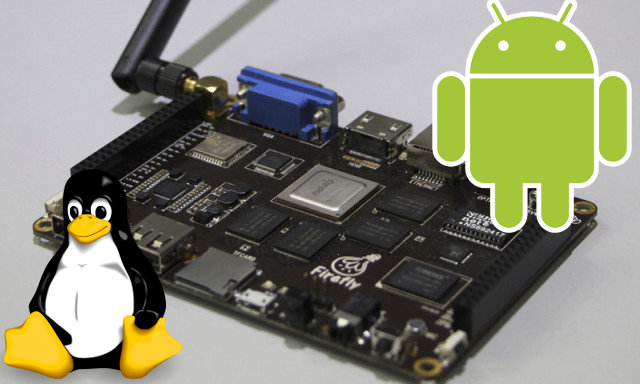Firefly-RK3288 development board was first announced in July. I still don’t have news about availability nor pricing, but the T-Firefly website launched yesterday. They seem do have a nice Wiki, but unfortunately everything is currently in Chinese, except when you go to the download page. You’ll find firmware upgrade_tool for Linux and Windows, the USB drivers for rooting and firmware update, firmware images (Android 4.4.2, Ubuntu 14.04, and dual boot), the board schematics (PDF), and Android KitKat 4.4.2 SDK with U-Boot, Linux, and Android source code, some documentation, XBMC apk (no source) with H.265 hardware decode support for MP4, MOV and MKV container formats.
The SDK is available on Bitbucket. I planned to test it, but unfortunately my network connection is very slow (and unstable) to this server, and I failed to retrieve it with git clone. The company also posted the build instructions in Chinese in their website, but I’ll reproduce them here for Ubuntu 14.04.
- Install required packages:
123456sudo apt-get install git-core gnupg flex bison gperf libsdl1.2-dev \libesd0-dev libwxgtk2.8-dev squashfs-tools build-essential zip curl \libncurses5-dev zlib1g-dev pngcrush schedtool libxml2 libxml2-utils \xsltproc lzop libc6-dev schedtool g++-multilib lib32z1-dev lib32ncurses5-dev \lib32readline-gplv2-dev gcc-multilib libswitch-perl gcc-arm-linux-gnueabihf \lzop libncurses5-dev libssl1.0.0 libssl-dev - Checkout the SDK:
123mkdir -p ~/edev/fireflycd ~/edev/fireflygit clone https://bitbucket.org/T-Firefly/firefly-rk3288.git - Build the Linux kernel:
123cd firefly-rk3288/kernelmake firefly-rk3288_defconfigmake -j8 rk3288-box.img - Build Android:
123cd ..make -j8./mkimage.sh ota
And after some patience, Android should be fully build. Instructions to create a Ubuntu image are also available in the Wiki, but only in Chinese.

Jean-Luc started CNX Software in 2010 as a part-time endeavor, before quitting his job as a software engineering manager, and starting to write daily news, and reviews full time later in 2011.
Support CNX Software! Donate via cryptocurrencies, become a Patron on Patreon, or purchase goods on Amazon or Aliexpress






The wiki is mostly translated from the radxa wiki and androtab.info but with practical screenshots. Another follower of radxa 🙂
There’s no TS container for 265 here…. is this an hint that review of UyeSee G1H was not complete? There container was almost only TS while here are listed only mp4, mkv and mov….
Should I cross my fingers?
Tom Your the BIG Boss….Luffy is the next in BOSS.
Sounds interesting..
Does it’s linux image have support for GPU & VPU ?
@Piyush Verma
plan B libhybris
Not bad, though I don’t see a place to buy it. Not sure if buying this or wait for a Radxa Rock 2
I would await … from Radxa there will be some surprises with Rock 2 … 😉
@Jibril I think you are right…
@Jibril sure there will be 🙂
@matt
I used MX Player to play H.265 in that review, not XBMC.
@cnxsoft
Yes, but TS container is not so common for anything more than mpeg2, so let’s hope mp4, mkv and mov container H.265 “compatibility” is different for the whole rk3288.
(I have an A10 box and as today still haven’t found a decent way to play H.264, tried many)
My $.02 on this is that it was a brave move on the engineer’s part to release this product as open source at all. Personally, I welcome any open source hardware, no matter its degree of openness. Let’s compare this board to a new samsung phone…. Yeah, Firefly’s a whole lot better!
Samsung Phones has 4xCortex-A15+4xCortex-A7 (big.LITTLE configuration)
but rockchip has 4xCortex-A17
And rockchips software is really bad optimized at least RK3122 was bad.
Lots of memory copy => bad for video playback
http://www.anandtech.com/show/7739/arm-cortex-a17
@Jacob Gadikian
Open Source Hardware normally refers to http://www.oshwa.org/definition/
If they don’t release the files necessary to modify the hardware, it’s not really open source hardware. It’s true very few companies release open source hardware. The only ones I can think of are CircuitCo (BeagleBone Black, Minnowboard), Olimex (all their Olinuxino boards), and Arduino. Many system-on-module companies also release their baseboard under an open source hardware license.
But Raspberry Pi, Cubieboard X, Radxa Rock, Wandboard.. etc.. are not open source hardware, but for most people that’s good enough.
@m][sko
I think he was referring to the openness of the platform.
I was, but you’re right. Better terminology is needed here as this isn’t the first time that I’ve seen this confusion come up. Or, just for another example of it, have a look at all of the licenses on upverter– is there a dominant “open platform” open hardware license? That is– one that does not certify that one can download the totality of the plans for the CPU & GPU but instead guarantees that
A) The board could be built by the user if they had the parts & equipment needed
B) The board’s essential software is open source.
Thanks in advance for your thoughts 🙂
@cnxsoft radxa rock will be open source hardware.
@Jacob Gadikian
I think the one I linked before is the dominant one.
It implied your can download the hardware files, source the components relatively easily, and access software that can boot the hardware.
@Tom Cubie
Great!
@Tom Cubie
Will we find 4 lanes MIPI on the Radxa 2?
The Firefly-RK3288 SDK can also be downloaded from Google Drive: https://drive.google.com/folderview?id=0B7HO8lbGgAqAdU1tbnNkY25udFE&usp=sharing